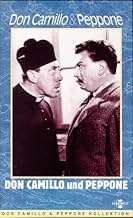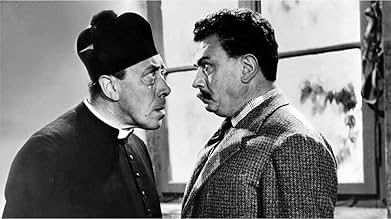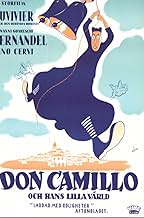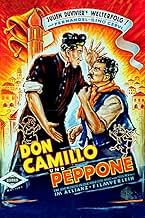VALUTAZIONE IMDb
7,6/10
5088
LA TUA VALUTAZIONE
Un prete determinato e un sindaco comunista sviluppano un'amicizia riluttante nonostante la loro rivalità ufficiale.Un prete determinato e un sindaco comunista sviluppano un'amicizia riluttante nonostante la loro rivalità ufficiale.Un prete determinato e un sindaco comunista sviluppano un'amicizia riluttante nonostante la loro rivalità ufficiale.
- Regia
- Sceneggiatura
- Star
- Nominato ai 1 BAFTA Award
- 3 vittorie e 3 candidature totali
Vera Talchi
- Gina Filotti
- (as Vera Talqui)
Charles Vissières
- Il Vescovo
- (as Charles Vissiere)
Clara Auteri Pepe
- Woman saying 'Viva Peppone!'
- (as Clara Auteri)
Manuel Gary
- Il delegato
- (as Manoel Gary)
Recensioni in evidenza
French comic actor Fernandel embodied the title role while remarkable Italian character actor Gino Cervi played his spiritual and political opponent. More than a rustic comedy, the film epitomizes the postwar political polarization in Italy and symbolizes the famous "compromesso storico"---historical compromise---under which Italy would long continue to be governed. This successful film spawned a series of popular sequels, mostly with the same two actors, all based on the Giovanni Guareschi novels. A point of clarification: this was a French-Italian co-production and was first released in the U.S. in its French-language version with English subtitles before the dubbed English version with narrator Orson Welles went into circulation. The Italian-language version, not readily available, is the most appropriate one.
I think this is a very funny movie, Despite the fact it is a white&black film and you really can tell that it is placed on a certain time frame (end of 1940's - early 1950's), the plot is fun and universal. It gives you a glimpse of the life on a small Italian town, where simple things turns into hilarious situations, thanks to the strange relationship of friendship/rivalry between Don Camillo and Mayor Peppone. I was lucky to see the original french version (subtitled, of course) which is always better than hearing a translated version. I think that original voices -even if you do not understand the language- reveal the character's feelings, and give credibility to actor's performances. After the film, you get the impression that life is somewhat easier to cope with...
(Since I originally submitted this review to the IMDb, an English-subtitled DVD of "The Little World of Don Camillo" -- and of its first sequel, "The Return of Don Camillo" -- has become available in the US. However, I still think that a fan might be interested looking at in the old dubbed version, if he or she can find it.)
This film is the first in a series of five shot in the 1950s and 60s based on Giovanni Guareschi's well-loved "Don Camillo" stories. The joint Italian-French productions were made with the involvement of the author himself, who wrote screenplays and Italian dialog for various entries in the series; therefore, most consider them to be the official movie versions of the Don Camillo stories. Guareschi is quoted as warmly approving of the way that stars Fernandel and Gino Cervi brought to life his two famous protagonists, the battling parish priest and Communist mayor of a small village in post-war Italy. Today, more than forty years after the series was completed, the films are still played on European television, dubbed into a variety of languages. Unfortunately, however, they are all but unknown to English-speaking fans (particularly American ones) of Giovanni Guareschi and his wonderful characters.
But this need not be, for "Le Petit Monde de Don Camillo" (1951) does exist in an English-dubbed version. The only one of the five films to get the treatment, it is quite well done (once you get around the fact that it's dubbed in the first place). "King of Dubbers" Robert Rietti (Rietty) takes on the roles of both Don Camillo and Peppone, while none other than Orson Welles provides the voice-over narration and, in that capacity, the voice of Christ which Don Camillo hears in answer to his prayers. The narration is intrusive at times (they got their money's worth out of Welles), but the movie overall is a faithful adaptation and interweaving of some of the more memorable early Don Camillo tales.
As the story opens, we meet hot-tempered Don Camillo complaining to the Lord about the recent election of the town's Communist contingent. The new Mayor, Peppone, is a particular thorn in Camillo's side, as the two have had an on-going rivalry which only escalates after the election. Conflicts abound: Peppone wants to have his son baptized "Lenin," but Don Camillo has other ideas. The priest has been trying for years to scrape together the money for a town recreation center, then suddenly the Communists tap an unorthodox source of funds and build their own "People's Palace." Peppone wants to fly the Red banner at a church procession, and he doesn't take Don Camillo's veto well. Don Camillo invests heart and soul into a soccer match between the church's team and the Party's, and he doesn't understand why the Lord declines to take a side. The Communists call a strike against the local landowners, but Don Camillo is determined to save the neglected farm animals. And somehow, amid all the sometimes humorous, sometimes serious conflict, a Catholic "Juliet" and a Communist "Romeo" have fallen in love. Can priest and mayor lay down their fists and help them?
I should add, for the *very* knowledgeable Don Camillo film fan, that the dubbed version of "Little World" is based on the Italian rather than the French cut of the original movie (director Julien Duvivier and the mostly bilingual cast shot the two versions simultaneously). Thus, certain scenes that appeared in the French release but were excised by the censors in stricter Italy will not be in the English version.
I believe the dubbed version of "The Little World of Don Camillo" is still available in vintage video catalogs (that's where I got my VHS edition in 1998), and it's worth looking for, especially for fans of the warm and whimsical tales on which it is based.
This film is the first in a series of five shot in the 1950s and 60s based on Giovanni Guareschi's well-loved "Don Camillo" stories. The joint Italian-French productions were made with the involvement of the author himself, who wrote screenplays and Italian dialog for various entries in the series; therefore, most consider them to be the official movie versions of the Don Camillo stories. Guareschi is quoted as warmly approving of the way that stars Fernandel and Gino Cervi brought to life his two famous protagonists, the battling parish priest and Communist mayor of a small village in post-war Italy. Today, more than forty years after the series was completed, the films are still played on European television, dubbed into a variety of languages. Unfortunately, however, they are all but unknown to English-speaking fans (particularly American ones) of Giovanni Guareschi and his wonderful characters.
But this need not be, for "Le Petit Monde de Don Camillo" (1951) does exist in an English-dubbed version. The only one of the five films to get the treatment, it is quite well done (once you get around the fact that it's dubbed in the first place). "King of Dubbers" Robert Rietti (Rietty) takes on the roles of both Don Camillo and Peppone, while none other than Orson Welles provides the voice-over narration and, in that capacity, the voice of Christ which Don Camillo hears in answer to his prayers. The narration is intrusive at times (they got their money's worth out of Welles), but the movie overall is a faithful adaptation and interweaving of some of the more memorable early Don Camillo tales.
As the story opens, we meet hot-tempered Don Camillo complaining to the Lord about the recent election of the town's Communist contingent. The new Mayor, Peppone, is a particular thorn in Camillo's side, as the two have had an on-going rivalry which only escalates after the election. Conflicts abound: Peppone wants to have his son baptized "Lenin," but Don Camillo has other ideas. The priest has been trying for years to scrape together the money for a town recreation center, then suddenly the Communists tap an unorthodox source of funds and build their own "People's Palace." Peppone wants to fly the Red banner at a church procession, and he doesn't take Don Camillo's veto well. Don Camillo invests heart and soul into a soccer match between the church's team and the Party's, and he doesn't understand why the Lord declines to take a side. The Communists call a strike against the local landowners, but Don Camillo is determined to save the neglected farm animals. And somehow, amid all the sometimes humorous, sometimes serious conflict, a Catholic "Juliet" and a Communist "Romeo" have fallen in love. Can priest and mayor lay down their fists and help them?
I should add, for the *very* knowledgeable Don Camillo film fan, that the dubbed version of "Little World" is based on the Italian rather than the French cut of the original movie (director Julien Duvivier and the mostly bilingual cast shot the two versions simultaneously). Thus, certain scenes that appeared in the French release but were excised by the censors in stricter Italy will not be in the English version.
I believe the dubbed version of "The Little World of Don Camillo" is still available in vintage video catalogs (that's where I got my VHS edition in 1998), and it's worth looking for, especially for fans of the warm and whimsical tales on which it is based.
...Actually, of all those adjectives, `Italian' was the first to leap to mind. I can't believe the IMDb has decided to classify this film under a French name. `Things happen there that could happen nowhere else in the world,' says the narrator. It's easy to believe.
The Catholics and the communists are battling for the soul of a small village. It's to be hoped that neither side ever wins. Nor is it likely that either side ever will win. This would spoil everyone's fun.
The communist mayor, is, so to speak, the Anglican of the two: someone who will gruffly talk about burning all the capitalists, while letting it be understood that he doesn't really intend his words to be taken literally. The priest (Don Camillo) is hot-headed, as fiercely loyal to the Catholic Church as the mayor is to his party, at once highly intelligent and preternaturally simple minded. He's the kind of Catholic who avoids absurdity by the time-honoured trick of simply not thinking about the doctrines to which he officially subscribes. His `prayers' are impromptu conversations with Jesus, or perhaps simply with the icon of Jesus that hangs on his wall - whichever it is, the film humours his fancy by having Jesus (or the icon) talk back to him. To this day I'm not sure if Jesus (or the icon) is REALLY talking back, or if it's just Don Camillo's imagination. What does it matter? It is, after all, no more than a private eccentricity. It's not as if he talks to or about Jesus in PUBLIC.
No one - not atheists, not communists, not Christians, not Norse pagans - could object to the film's big-hearted fantasy, or fail to like either of the two very likeable protagonists. I gather there are several sequels: the one I've seen isn't nearly as good; and the original feels so much like an archetype that I suspect any sequel would be little more than a footnote.
The Catholics and the communists are battling for the soul of a small village. It's to be hoped that neither side ever wins. Nor is it likely that either side ever will win. This would spoil everyone's fun.
The communist mayor, is, so to speak, the Anglican of the two: someone who will gruffly talk about burning all the capitalists, while letting it be understood that he doesn't really intend his words to be taken literally. The priest (Don Camillo) is hot-headed, as fiercely loyal to the Catholic Church as the mayor is to his party, at once highly intelligent and preternaturally simple minded. He's the kind of Catholic who avoids absurdity by the time-honoured trick of simply not thinking about the doctrines to which he officially subscribes. His `prayers' are impromptu conversations with Jesus, or perhaps simply with the icon of Jesus that hangs on his wall - whichever it is, the film humours his fancy by having Jesus (or the icon) talk back to him. To this day I'm not sure if Jesus (or the icon) is REALLY talking back, or if it's just Don Camillo's imagination. What does it matter? It is, after all, no more than a private eccentricity. It's not as if he talks to or about Jesus in PUBLIC.
No one - not atheists, not communists, not Christians, not Norse pagans - could object to the film's big-hearted fantasy, or fail to like either of the two very likeable protagonists. I gather there are several sequels: the one I've seen isn't nearly as good; and the original feels so much like an archetype that I suspect any sequel would be little more than a footnote.
This is, and has been since I was a young boy, one of my favorite movies.
It's the story of a Catholic priest and a Communist mayor who are each others worst enemy and best friend. The dialogs are just great, but what I like most about these movies (there a are 5 in total) is that both main characters (Don Camillo and Peppone) are "real people". They act on impulse, say one thing but think the other, manipulate... they are real humans. When one of Peppone's people dies and asks for the church-bells to be rang at his funeral, Don Camillo refuses because he was no Catholic. Peppone orders a big bell to be placed in the town square which Don Camillo sabotages. The bell is broken and sounds horrible but at the end, Don Camillo rings his bells because "by asking for the bells, the boy was asking for God". This is one of these typical things I like about these movies.
I've got the good fortune I also understand French and can watch these movies in that language. I can't imagine what they would sound like in English but I would advice anyone to watch them in the French version. I hate dubbed movies and can't imagine Fernandel speaking English (although in one movie he does which is hilarious). But in all, I think even the English version still is one of the best movies ever made.
If you're not prejudiced against black and white and foreign movies, this is a movie you have to see. If you are, you don't know what you're missing.
It's the story of a Catholic priest and a Communist mayor who are each others worst enemy and best friend. The dialogs are just great, but what I like most about these movies (there a are 5 in total) is that both main characters (Don Camillo and Peppone) are "real people". They act on impulse, say one thing but think the other, manipulate... they are real humans. When one of Peppone's people dies and asks for the church-bells to be rang at his funeral, Don Camillo refuses because he was no Catholic. Peppone orders a big bell to be placed in the town square which Don Camillo sabotages. The bell is broken and sounds horrible but at the end, Don Camillo rings his bells because "by asking for the bells, the boy was asking for God". This is one of these typical things I like about these movies.
I've got the good fortune I also understand French and can watch these movies in that language. I can't imagine what they would sound like in English but I would advice anyone to watch them in the French version. I hate dubbed movies and can't imagine Fernandel speaking English (although in one movie he does which is hilarious). But in all, I think even the English version still is one of the best movies ever made.
If you're not prejudiced against black and white and foreign movies, this is a movie you have to see. If you are, you don't know what you're missing.
Lo sapevi?
- QuizThe whole film was shot twice; there is a French and an Italien negative, that can be distinguished by details in editing and content (watch the position of the dog during the procession for example).
- Citazioni
Crocefisso: Where did you get that cigar, Camillo?
Don Camillo: Peppone had two. I think I took it without asking him. You know he believes in equal distribution of wealth.
- Versioni alternativeGerman version runs 2 minutes shorter than the Italian original version.
- ConnessioniFeatured in Cinema forever - Capolavori salvati (2001)
I più visti
Accedi per valutare e creare un elenco di titoli salvati per ottenere consigli personalizzati
- How long is The Little World of Don Camillo?Powered by Alexa
Dettagli
- Data di uscita
- Paesi di origine
- Lingue
- Celebre anche come
- The Little World of Don Camillo
- Luoghi delle riprese
- Aziende produttrici
- Vedi altri crediti dell’azienda su IMDbPro
- Tempo di esecuzione
- 1h 36min(96 min)
- Colore
- Proporzioni
- 1.37 : 1
Contribuisci a questa pagina
Suggerisci una modifica o aggiungi i contenuti mancanti

























